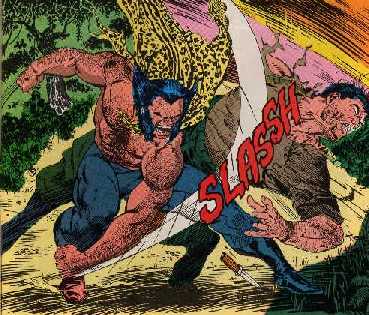 From an article in the LA Times, 6/11/00, entitled "Behind the Bunker Mentality":
From an article in the LA Times, 6/11/00, entitled "Behind the Bunker Mentality": From an article in the LA Times, 6/11/00, entitled "Behind the Bunker Mentality":
From an article in the LA Times, 6/11/00, entitled "Behind the Bunker Mentality":
The LAPD habitually does not wait. A top command officer in the department, asked afterward about this incident, said with some exasperation, "Look, we carry guns for a reason. It's not there for ballast."
Written LAPD policies explicitly authorize the use of deadly force to protect officers or others from "an immediate threat of death or serious bodily injury. . . . Deadly force shall only be exercised when all reasonable alternatives have been exhausted or appear impracticable."
Among those things that are "impracticable," the department maintains, are shooting to wound or shooting to disarm a suspect, like in the movies. The LAPD teaches its officers to shoot to kill, or, as it is more neutrally put, to aim for a "center mass hit." Center mass on a human being is the chest.
Chief Parks is asked about the shooting [of a man with a knife], and about the LAPD's general lack of patience.
"Spontaneous events will always be the Achilles' heel of police officers," he says. "Because they must act immediately. They can't retreat. We would be offended if we turned on the TV and saw police officers retreating down the street, running from a crime."
*****
Dave Smith, a recently retired division captain, says there is a constant push for aggressive behavior.
"Compassion is a weak word. It's worse than soft. It's almost communist," Smith says. "At roll call once I praised somebody for not shooting a robbery suspect. They had every right to, but waited that extra second and didn't. Several sergeants came up to me later and said, 'Cap, you're sending the wrong message out there. Somebody could get killed.'
"The worst thing is to sit around with a bunch of cops watching a barricade situation. They'll all be grousing, 'Shoot the son of a bitch so we can get home.' "
*****
For all his innovation in dealing with the good citizens, [former Police Chief] Davis was unapologetic about how he dealt with those he thought were bad. And he was resolutely sure he could tell the difference. The God-fearing middle class was good; homosexuals, Black Panthers and a wide variety of other radicals and pornographers were bad. Davis spoke fervently about scrubbing the city clean.
*****
"[Former Police Chief] Gates saw he wasn't going to get the money to grow the department," says Bayan Lewis, then an LAPD command officer. "He really fostered the military aspect, created an occupational army, the Hammer, anti-gang task forces, sweeps in which we'd arrest 1,000 people, arrest anything that looked or spoke like a gang member. Few of them were ever charged, but it was effective. By God, if you even look like a gang member, you're going to jail."
*****
Most cops, according to profiles constructed by LAPD psychologists, go into police work in large part because they like to have control over their lives. They like to be left alone to do their jobs. If not princes of the city, then they would be knights at least.
*****
This leads to a discussion of how you tell who is a gang member. [Officers] Cochran and Garcia decide: baggy clothes, hanging out, attitude, tattoos, making gang signs.
But couldn't one or more of these criteria apply to thousands of people who aren't gang members?
"If you dress like a duck, act like a duck, quack like a duck, then you probably are. If I don't think this way as a police officer, I'd be dead. And I've seen way too many dead people," Cochran says. "It's fine and dandy if all of this is on paper, drawn out. Out here, there's a gray area that just keeps moving."
*****
When they're feeling particularly defensive, which is often these days, conversations with members of the LAPD often circle around to a scene in a movie—this is Los Angeles, after all.
The movie is "A Few Good Men." In the scene often cited, an angry Marine colonel played by Jack Nicholson berates a lawyer who has questioned his judgment.
"Son, we live in a world that has walls. And those walls have to be guarded by men with guns. Who's gonna do it? You?" Nicholson says.
There remains in the LAPD a general feeling that anyone unwilling to stand in the line of fire is discredited as a critic of those who do. As numerous officers put it: "We're the only people in society, when we hear shots being fired, we run toward the bullets."
*****
"All police departments tend to be inward-looking," he says. "But LAPD is worse than anybody. It's us against the world. We see ourselves as the last bastion of good people in a world that's crumbling."
Schmidt to Nicholson: "It won't be you, Colonel, because you'll be in the brig doing hard time. When you're breaking rocks on a prison chain gang, maybe you can reflect on how an unrestrained police force leads to a police state."
If you see any similarities between the now-notorious LAPD and comic book/cartoon/movie/TV/video game heroes and villains, men and women, whites and minorities, Americans and foreigners, Hitler and Jews, cowboys and Indians, popes and heathens, et al., give yourself a gold star.
Related links
Violence in America
America's cultural mindset
|
. . . |

|
All material © copyright its original owners, except where noted.
Original text and pictures © copyright 2007 by Robert Schmidt.
Copyrighted material is posted under the Fair Use provision of the Copyright Act,
which allows copying for nonprofit educational uses including criticism and commentary.
Comments sent to the publisher become the property of Blue Corn Comics
and may be used in other postings without permission.